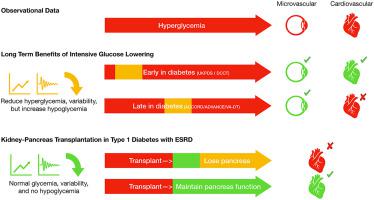Atherosclerosis ( IF 4.9 ) Pub Date : 2021-09-09 , DOI: 10.1016/j.atherosclerosis.2021.09.001 Peter A Senior 1

|
Diabetes is a major risk factor for cardiovascular (CV) disease. In contrast to the clear benefits from treatments which reduce blood pressure and lipids, clinical trials targeting blood glucose have not shown clear CV benefits. Interventions to intensify glycemic control early in the course of diabetes may have benefits in long term observational studies (DCCT-EDIC/UKPDS), but may not be helpful if introduced late in the course of type 2 diabetes (ACCORD, ADVANCE, VA-DT). More recent CVOT in high risk subjects suggest that the benefits of SGLT2 and GLP1-RA are glucose-independent. Type 1 diabetes provides a “cleaner” model to study the links between glucose and cardiovascular disease. Abnormalities of glucose regulation in type 1 diabetes is not restricted to hyperglycemia, but includes glycemic variability and hypoglycemia. Increasingly the mechanisms linking glycemic variability and hypoglycemia as key mediators of cardiovascular complications are being understood. Furthermore, data from pancreas and islet transplantation showing reduced cardiovascular mortality and regression of intima-media thickness supports a causal role for glucose in the pathogenesis of atherosclerosis, but suggests that restoration of normal glucose regulation may be required to demonstrate substantial impact on CV risk accrued over decades of type 1 diabetes. Considering the limited organ supply and risks of immunosuppression, advances in biology (stem cell derived beta cells) or technology (automated insulin delivery systems) will be required to provide a scalable solution to deliver optimal glucose control and reduce CV risk for people with type 1 diabetes.
中文翻译:

葡萄糖作为动脉粥样硬化性心血管疾病的可改变原因:来自 1 型糖尿病和移植的见解
糖尿病是心血管(CV)疾病的主要危险因素。与降低血压和血脂治疗的明显益处相反,针对血糖的临床试验并未显示出明显的 CV 益处。在糖尿病病程早期加强血糖控制的干预措施可能在长期观察性研究 (DCCT-EDIC/UKPDS) 中有益,但如果在 2 型糖尿病病程后期引入可能无益 (ACCORD、ADVANCE、VA-DT )。最近在高风险受试者中进行的 CVOT 表明 SGLT2 和 GLP1-RA 的益处不依赖于葡萄糖。1 型糖尿病提供了一个“更清洁”的模型来研究葡萄糖和心血管疾病之间的联系。1 型糖尿病的葡萄糖调节异常不仅限于高血糖,还包括血糖变异性和低血糖。人们越来越多地了解将血糖变异性和低血糖联系起来作为心血管并发症的关键介质的机制。此外,来自胰腺和胰岛移植的数据显示心血管死亡率降低和内膜中层厚度消退支持葡萄糖在动脉粥样硬化发病机制中的因果作用,但表明可能需要恢复正常的葡萄糖调节才能证明对累积的心血管风险产生实质性影响经过数十年的 1 型糖尿病。考虑到器官供应有限和免疫抑制的风险,需要生物学(干细胞衍生的 β 细胞)或技术(自动胰岛素输送系统)的进步来提供可扩展的解决方案,以实现最佳血糖控制并降低 1 型患者的心血管风险糖尿病。











































 京公网安备 11010802027423号
京公网安备 11010802027423号